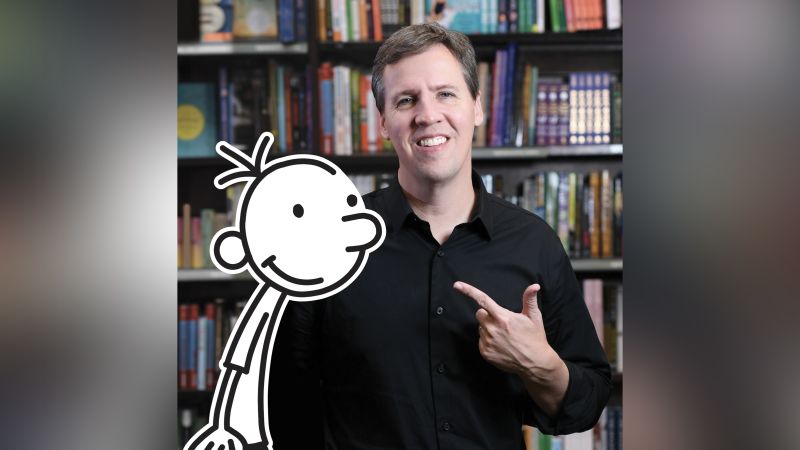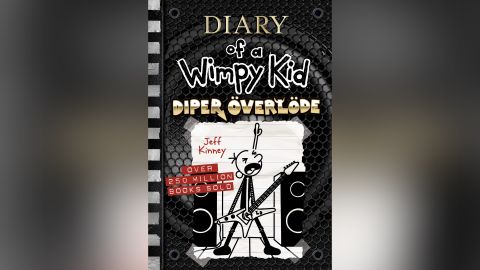
CNN
—
When author Jeff Kinney started writing the “Diary of a Wimpy Kid” series more than 15 years ago, he set out to create a comic that would resonate with adults and live in the humor section of book stores.
“I’m really glad that I didn’t know that I was writing for kids because I think that oftentimes when an adult writes a kid’s book, they start with the lesson in mind. And so the priority of the book becomes the lesson,” Kinney recalled in a recent interview with CNN. “I focus on humor and I focus on the things that would make me laugh. And I think that’s part of the secret sauce of ‘Diary of a Wimpy Kid.’”
Kinney’s “secret sauce” of chronicling seventh-grader Greg Heffley’s awkward, hilarious, and highly-relatable middle school life, it turned out, became wildly popular with young readers. “Diary of a Wimpy Kid” has sold more than 275 million copies, according to its publisher, with book number 17 in the series, “Diper Överlöde,” releasing Oct. 25.

“Greg is wimpy. Usually, it means kind of like a physical weakling, but it can also just mean somebody who’s not that effective. And I think that Greg feels that way,” Kinney said. “If you look at him on the cover of book one, you know everything you need to know about Greg. He feels like he’s sort of shouldering the weight of the world on that backpack that he carries.”
Kinney said he thinks of Greg more as a cartoon character than a literary character. With that, he explained, comes a commitment of consistency to his audience.
“When you have a cartoon character, it’s a promise to the reader that they won’t go away and that they won’t change or really evolve that much. They’re recognizable,” Kinney said. “Kids grow out of my books, of course, but there’s a ton of a comfort in knowing that the story continues… these books have been a consistent part of many young people’s lives for a great long time. It’s kind of a cool thing to think that you’re a part of the fabric of people’s growing up years.”
Exposing kids to a wide range of books is something Kinney values, both as an author and as co-founder of independent book store An Unlikely Story in Plainville, Massachusetts, which he owns with his wife.
When asked about a recent cultural move to ban various books from school and public libraries, Kinney cited a letter to Congress signed by him and more than a thousand other authors, written by two-time Newbery Honor-winner Christina Soontornvat: “‘Reading stories that reflect the diversity of our world builds empathy and respect for everyone’s humanity.’”
“Representation isn’t just a buzzword,” Kinney added. “It’s essential. Sometimes it’s essential to a kid’s long-term survival. I think we all should be making sure that our kids experience different types of views because it makes us better as people and makes us better as a country.”
With that goal in mind, here are five books for middle school readers recommended by Kinney:
“The Door of No Return,” by Kwame Alexander
In this novel inspired by history, a sudden loss sends 11-year-old Kofi Offin on a “harrowing journey across land and sea, and away from everything he loves,” reads the publisher’s description of the story.
“Class Act: New Kid,” by Jerry Craft
A graphic novel with heart and humor, eighth-grader Drew Ellis is one of the few kids of color at a prestigious private school. As social pressures mount, “will Drew find a way to bridge the divide so he and his friends can truly accept each other? And most important, will he finally be able to accept himself?” the publisher synopsis asks.
“Three Keys,” by Kelly Yang
A sequel to the award-winning novel “Front Desk,” sixth-grader Mia faces some new challenges at school and at home in her family’s Calivista Motel. “But if anyone can find the key to getting through turbulent times,” the author’s description reads, “it’s Mia Tang!”
“The Last Last-Day-of-Summer,” by Lamar Giles
A magical story with imagination and heroism about two adventurous cousins who wish for an extended summer and accidentally freeze time. According to the publisher’s synopsis, the boys learn that “the secrets hidden between the seconds, minutes, and hours aren’t quite the endless fun they expected!”
“Boys Will Be Human,” by Justin Baldoni
A self-esteem building guidebook for boys ages 11 and up, producer, actor and author Baldoni explores the social and emotional learning around confidence, courage, strength and masculinity. “This book isn’t about learning the rules of the boys’ club,” a tagline reads, “it’s about UNLEARNING them.”
